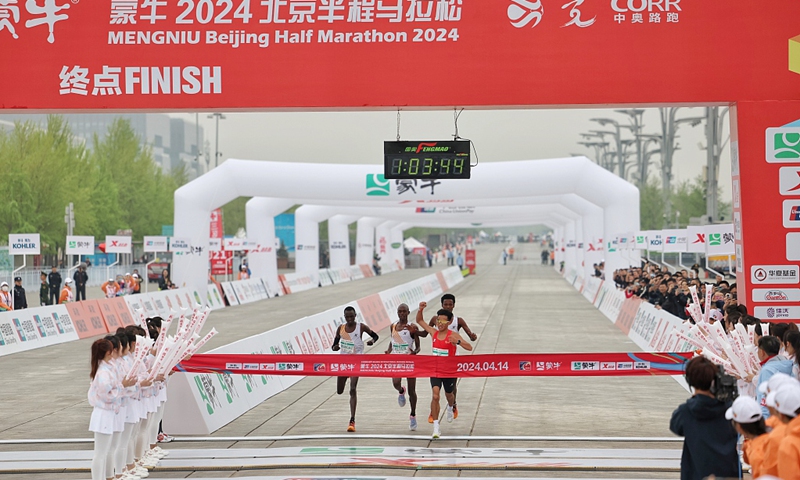
He Jie crosses the finish line of Beijing Half Marathon on April 14, 2024. Photo: VCG
Once a niche pursuit, marathons now have a vast and enthusiastic following, uniting amateur and elite athletes in a celebration of endurance and community. In 2024, the Chinese marathon scene has been making headlines with record-breaking performances and a growing wave of participation. From the energetic streets of the nation's capital city Beijing to the scenic canals of Changzhou in East China's Jiangsu Province, these races are positioning China as a burgeoning hub for one of the world's most challenging yet fulfilling sports.
This year, He Jie completed the Wuxi Marathon with a time of 2 hours, 6 minutes, and 57 seconds, setting a new national record. Wu Xiangdong achieved a time of 2 hours, 12 minutes, and 34 seconds in the Paris Olympic marathon, marking the best performance by a Chinese male athlete in an Olympic marathon.
In recent years, mass sports in China have developed rapidly, with fitness for all becoming a national strategy. Policies such as the "Healthy China 2030" blueprint have been introduced. As one of many popular fitness activities, marathons have garnered widespread enthusiasm from the public.
According to the 2023 Blue Book of China Road Running Events released by the Chinese Athletics Association on March 22, a total of 699 road running events were held nationwide in 2023, with over 6 million participants. Over 2.5 million people nationwide have now completed either a half or full marathon.
Unlike many other sports, marathons hosted in different cities across China offer a unique experience where amateurs and professionals can compete side by side. The growing popularity of marathons provides exciting new opportunities for Chinese athletes and cities alike. Marathons breathe new life into cities by promoting tourism and boosting local economies.
These events have become powerful tools for city branding and promotion, often integrating local landmarks and culture into their routes. For example, in a marathon held this year in Changzhou, the course incorporated ancient and modern attractions, as well as the history and culture of the Grand Canal. In addition to city marathons, some Chinese cities are actively bidding to host international marathon events.
The future of Chinese marathons lies in fostering inclusivity, maintaining high standards for public events, and continuing to integrate the sport with the unique character of each city.
With this momentum, China is poised to become a rising star in the marathon world, inspiring millions to lace up their shoes and run toward a healthier, more active future.
The author is a reporter with the Global Times. life@globaltimes.com.cn




